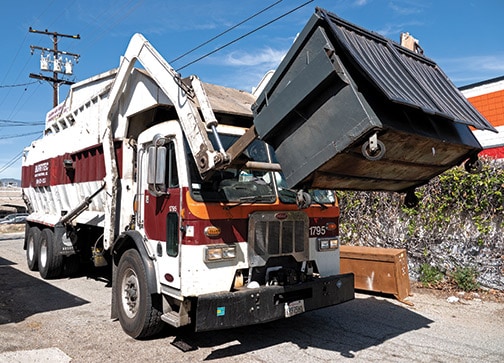Possible sanitation fee hikes tied to new state law

by Steven Felschundneff | steven@claremont-courier.com
A new organics waste law from the state, in addition to reduced global demand for recyclable materials will likely result in sanitation rate hikes for Claremont residents beginning this summer.
After hearing a presentation from city staff and the consulting firm Willdan Financial Services on Tuesday, the Claremont City Council voted to go ahead with the legal notification process that is a prerequisite to an increase in sanitation fees.
At the core of the rate hike is a new law from Sacramento requiring cities to compost organic wastes that currently go to landfills to reduce methane gas emissions. This law, SB 1383, requires all cities in California to implement a universal organic waste recycling program on or before January 1, 2022. Organic waste includes landscape waste, food scraps, non-hazardous wood waste, and food-soiled paper products. The program is estimated to cost the city $400,000 per year.
Additionally, changing demand for the non-sorted recyclable materials Claremont collects in its curbside containers has shifted from a revenue generating enterprise to one that will become an expense for the city.
To offset these new expenses, Willdan recommended a fee increase of 12 percent annually for all residential, multi-fam
Residents with the small, 35-gallon refuse container, which currently costs $23.46 per month, will pay $26.28 under the new rate structure. Each single family home or unit in a multifamily complex will be allowed three containers: refuse, recyclables and green waste.
“The $5.50 fee is intended to offset the cost of added organics and recyclable processing and provide a more equitable pricing structure where rates are more closely tied to the amount of waste that is generated,” Public Information Officer Bevin Handel said in a statement.
The city launched a food waste pilot program last month, which is part of the process to be in compliance with SB 1383. If Claremont does not limit the food waste that ends up in landfills by January 2022, it could face fines from the state.
The fee increase proposal is part of a sanitation rate study the city commissioned from Willldan earlier this year. The firm prepared a five-year financial model that included projected revenues as well as projected expenses such as vehicle replacement, operation and maintenance. The report also considered anticipated growth and reserve targets.
Willdan also conducted a five-year cost projection for the city’s sewer system, concluding that no addition fees will be needed this year, but a cost of living increase up to three percent may be necessary next year.
In 2017, the city entered into a five-year contract with Waste Management, which paid the city approximately $17 per ton for recycled materials. In January 2018, China banned imports on 24 categories of scrap materials including low grade plastics and unsorted mixed paper. Until that time, 62 percent of California’s exported recyclable materials were sent to China, according to the city.
In January of 2022, Claremont will begin paying market rates for processing and disposal of mixed recyclables, which is estimated to cost $65 per ton. The city generates approximately 5,500 tons of recyclable material annually, resulting in a new anticipated cost of $357,000. When combined with the lost revenue, the total anticipated budgetary impact will be approximately $455,000 annually.
The city currently pays $33 per ton for landfill waste, but Claremont will be paying $85 per ton for organics, which includes a hauling fee. The substantially higher price primarily is a result of the cost for the facilities to process the material, including finding end markets.
“Unlike the sewer fund the sanitation fund is going to experience significant impacts from what we are categorizing as external forces or external factors. Those factors are SB 1383 which is a new unfunded mandate for the state of California and global changes to the recycling market,” Jeff McGarvey, managing principal for Willdan said. “This particular regulatory package has been described as one of the most substantial to the industry in the past 30 years and it is going to have a substantial impact on the city.”
He said that his firm’s clients around the country have considered eliminating recycling programs altogether because they are cost prohibitive. But in California cities don’t have that option because they are required by the state to divert a certain amount of waste away from landfills and will just have to absorb the extra cost.
Following the presentation Tuesday night, the council expressed some exasperation with the situation in particular the “unintended consequences” of a state law that is designed to fight climate change but will also result in Claremont residents paying more for city services.
“If I am hearing you correctly, green and recycling is going to cost us more per ton than what is going into a landfill?” councilmember Ed Reece asked.
“It’s a little counterintuitive and not how you would hope the rate structure would work, because certainly we don’t want to stop our diversion [programs] that are important because we are a sustainably minded community,” Community Services Manager Kristin Mikula said.
Many Claremont residents have suggested that contracting with a private waste hauling company would solve the rate increase issue. However, these companies must also be in compliance with SB 1383 and have seen the same loss of revenue in recyclables.
The city of Upland, which contracts with Burrtec Waste Industries, increased sanitation rates 17 percent in 2020 to compensate for the increased processing and disposal costs due to changing recycling market. Additional rate changes are expected in Upland in the coming year due to SB 1383, according to a presentation by Ms. Mikula. The city of Norco which contracts with Waste Management increased sanitation rates by 16 percent to cover organic collection costs.
These external factors are anticipated to increase the cost to provide solid waste and recycling service in 92 percent of California cities.
In a survey, nearly a third of California cities indicated sanitation rates will increase from one to 10 percent in the next year while another third expected rates to rise 11 to 20 percent. Fourteen percent anticipated increases between 21 and 30 percent, five percent will raise prices 31 to 40 percent and six percent of cities will levy 41 to 100 percent increases, according to the city’s presentation.
The council voted unanimously to approve the legal notification process in advance of a rate increase required under proposition 218. Under that law, property owners and tenants directly liable for the payment of sanitation fees, must be notified of the rate increases and must be provided with the opportunity to submit a written protest.
Notices and protest ballots will be mailed in early April and can be submitted to the city up until May 25 when city council will again consider the issue.
The council agreed that while sending the letter is the bare minimum the city must do to keep the public informed, there is a greater responsibility to educate the public about why this rate increase is necessary, to “let them see these are our choices to be in compliance.”
Councilmember Reece suggested a separate line on the sanitation bill just for the SB 1383 increase so customers will know exactly why they are paying more.
Staff also noted that the city will have to educate residents on proper sorting of recyclables and organic waste to make the program work.










0 Comments